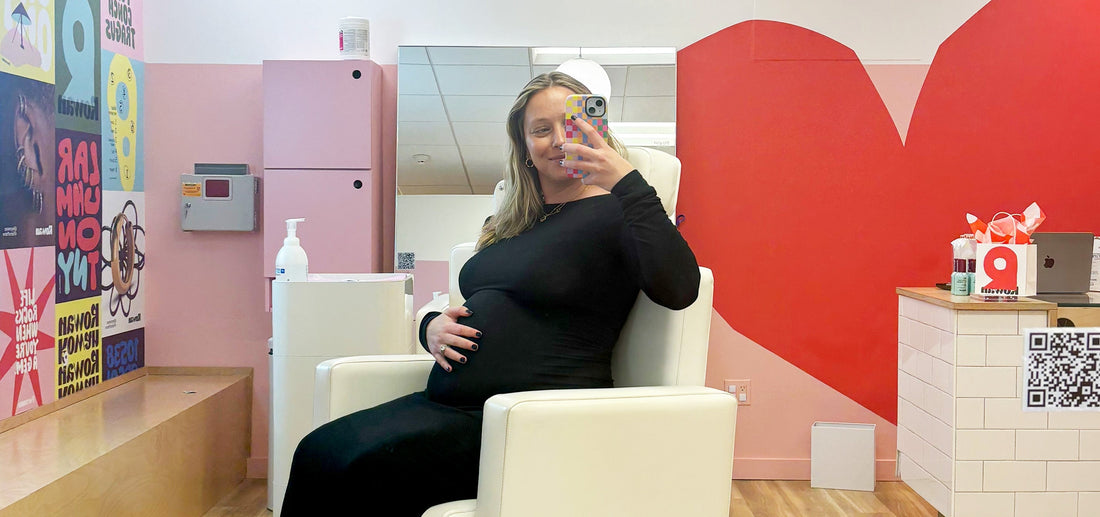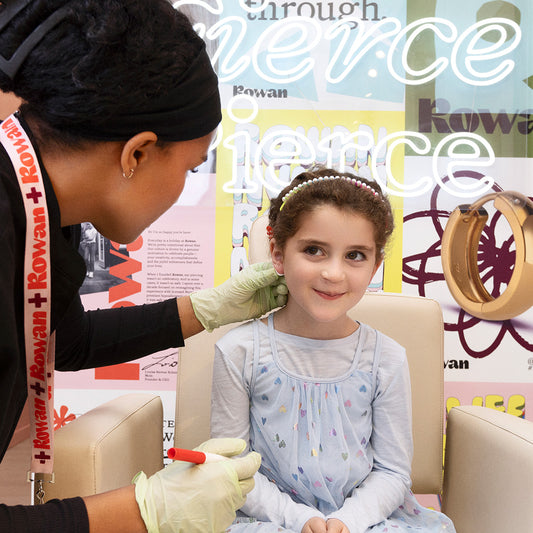Can You Get Your Ears Pierced While Pregnant?
Baby On the Way? Piercings can stay!

Are you pregnant and considering having your ears pierced? Here’s everything you need to know!
Is Ear Piercing Safe During Pregnancy?
The answer nobody wants to hear - it depends. Piercings, especially of the cartilage, should be considered “clean surgery” and are not inherently risk-free (which is why we believe all ear piercings should be performed by licensed nurses) (Lyons et al., 2012).
During pregnancy, your immune system is naturally weakened, which makes it easier for an infection to start. If you’re considering having your ears pierced while pregnant, it is especially important to follow your aftercare protocol to the ‘t.’ We talked with Autumn Wendler, CNM, MSN, C-EFM, who states, “Elective procedures [such as piercing] can be deferred to outside of pregnancy due to the immune shift that makes you more susceptible to infection, especially if they touch [the piercing] or don’t take good care of it.”
Rowan does pierce pregnant women, but we recommend speaking to your doctor before coming in for your piercing.
Why is the risk for infection higher when I’m pregnant?
Van Hoover, Rademayer, and Farley (2017) say that "Unhealed piercing tracts are a route for bacterial and viral invasion. This infection risk poses a potential hazard to the fetus, especially in regard to bloodborne disease” (pg. 526).
The risks of developing a poor piercing outcome during pregnancy are higher if you have other conditions, such as gestational diabetes, or are taking any form of blood thinner. These conditions can impair your body's ability to heal or may cause you to bleed more than normal during a piercing.
Note: this is not an exhaustive list of pregnancy-related conditions. It’s important to talk to your OB/GYN or CNM about your risk factors.
What if I already have piercings?
Fortunately, there’s no need to worry about existing piercings if you do become pregnant, as the risk of infection is not as high (Van Hoover, Rademayer, & Farley, 2017). However, it’s important to use only high-quality hypoallergenic earrings (like ours!) to ensure that you do not develop a reaction, especially if you have metal sensitivities, as this makes you more prone to developing an infection even in a healed piercing (Meltzer, 2005).
What should I do if I did get pierced and now have an infection?
If you did get pierced and think you’re developing an infection, the most important thing to do is have your primary care provider take a look at it right away. You can only take certain antibiotics when pregnant, which means that it’s important to begin treating the infection as soon as possible.
This all seems scary, what should I do?
The best advice is to talk to your healthcare provider to determine if you are a good candidate to receive an ear piercing. If your doctor gives you the green light, the most important thing to keep in mind is that caring for your piercing as it heals will be critical in avoiding an infection; cleaning the piercing regularly with freshly-washed hands and wearing only hypoallergenic earrings are just the tip of the iceberg when it comes to healing a piercing.
Check out our aftercare resources for tips and tricks on keeping your new piercing healthy. If your provider determines that ear piercing should not be performed, the good news is that we will be here and ready to help you celebrate once you have delivered.
Ear piercing is the perfect way to celebrate milestones. An honest conversation with your OB/GYN or CNM before heading to a piercing studio is strongly encouraged.
References:
Holbrook, J., Minocha, J., & Laumann, A. (2012). Body piercing complications and prevention of health risks. American Journal of Clinical Dermatology, 13(1), 1–17. https://doi.org/10.2165/11593220-000000000-00000
Lyons, M., Stephens, J., Wasson, J., DeZoysa, N., & Vlastarakos, P. V. (2012). High ear-piercing: An increasingly popular procedure with serious complications. Is good clinical practice exercised? European Archives of Oto-Rhino-Laryngology : Official Journal of the European Federation of Oto-Rhino-Laryngological Societies (EUFOS) : Affiliated with the German Society for Oto-Rhino-Laryngology - Head and Neck Surgery, 269(3), 1041–1045. https://doi.org/10.1007/s00405-011-1693-9
Meltzer, D. I. (2005). Complications of Body Piercing. American Family Physician, 72(10), 2029–2034.
Van Hoover, C., Rademayer, C. A., & Farley, C. L. (2017). Body Piercing: Motivations and Implications for Health. Journal of Midwifery & Women’s Health, 62(5), 521–530. https://doi.org/10.1111/jmwh.12630



